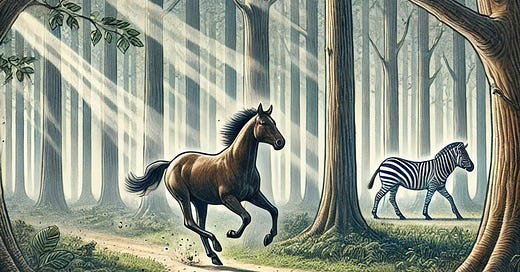The expression "When you hear hoofbeats, think of horses, not zebras" originates from medical training, particularly in the United States. It’s a guiding principle for diagnostic reasoning, encouraging doctors to consider common conditions (the "horses") before exploring rarer possibilities (the "zebras").
This phrase is credited to Dr. Theodore Woodward, a professor at the University of Maryland School of Medicine in the 1940s, who used it to teach his students to prioritize likely diagnoses.
For those with rare diseases, however, this saying can be problematic. It often leads to delayed or missed diagnoses, as doctors may overlook the "zebras" entirely. As a result, the zebra has become a symbol of the rare disease community—an emblem of uniqueness and rarity, but also of the challenges we face in being seen and understood.
But here’s a question: When a zebra hears hoofbeats, does it think of another zebra or a horse?
This question captures the uncertainty many of us with rare diseases live with daily. When I experience new or unusual symptoms, I try to rationalize that they’re probably something common. But there’s always that nagging what if?—what if it’s something rare or serious I shouldn’t ignore?
This is the reality of being a zebra: you never know. You live in a constant balancing act, teetering between rational concern and the fear of seeming overly anxious or paranoid. Am I overthinking a symptom that’s just normal for someone my age? Or am I missing something critical I should be tracking?
For those of us navigating life as zebras, this is our reality—a constant dialogue between horses and zebras, and the hope that someone will recognize the stripes we carry.





